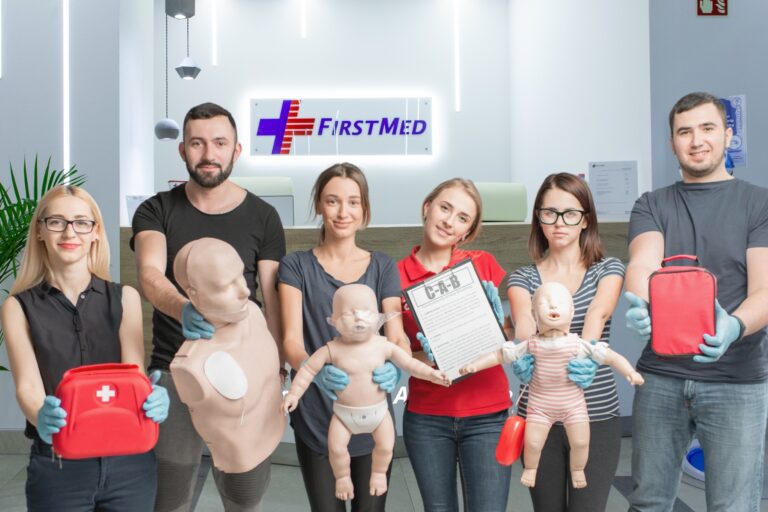 Opinions vary regarding how often your school-age child should have a complete physical. As a minimum, most pediatricians recommend a well-child exam before your child enters kindergarten and before entering high school. An additional examination is usually required for participation in a school sport.
Opinions vary regarding how often your school-age child should have a complete physical. As a minimum, most pediatricians recommend a well-child exam before your child enters kindergarten and before entering high school. An additional examination is usually required for participation in a school sport.
Regular physicals are a great way to protect your child’s future health. They offer the chance to:
- Keep your child safe and healthy
- Learn if a disease or condition is affecting your child
- Learn about health issues faced by school age children and adolescents
- Discuss health topics you might feel uncomfortable to discuss face to face with your child
- Check on your child’s vaccination status
- Teach your adolescent to take responsibility for their future health
At a typical physical exam your doctor will…
…check for signs of health problems and take some measurements including those listed below depending on your child’s age:
- Weigh and measure your child. Measuring your child and putting the results on a chart gives your doctor information about how your child is growing.
- Take your child’s blood pressure. Checking your child’s blood pressure could detect problems. Early detection could protect your child from high blood pressure later.
- Check your child’s ability to see and hear. Your doctor will check your children’s eyes and ears. He or she will ask about signs that your child has eye or ear problems that could make it harder for him to learn.
- Check your child’s mouth for dental problems. Tooth decay is the most common ongoing health problem for children. Although not a dentist, your doctor will examine your child’s mouth and might refer you to a dentist.
- Physical examination including review of some of the following depending on your child´s age; skin, head, eyes, ears, nose, mouth, glands, chest, lungs, abdomen, musculoskeletal system, neurologic system, external genitals, growth, pubertal development.
- Your doctor may choose to run some simple tests on your child’s urine or blood.
- Vaccinations. Your doctor will check your child’s immunization status and recommend appropriate vaccines as needed.
- Diphtheria, Tetanus and Pertussis
- Polio
- Measles, Mumps, and Rubella
- Hepatitis B
- Haemophilus Influenza B
- Varicella
- Hepatitis A
- Your doctor may suggest you immunize your child against other diseases, such as the flu.
… give advice on exercise and diet:
The habits your child learns now will affect him as an adult and are likely to set the pattern of adult eating and exercise.
Healthy food and regular activity can help your child:
- Grow properly
- Control his weight
- Feel better about himself
- Avoid health problems as an adult
Unfortunately, changes in lifestyle have resulted in a growing problem of childhood obesity in many countries. You doctor will discuss your child’s diet and activities with you. Specific changes to diet or activity level may be recommended.
… give advice on safety:
Improvements in preventative medicine and public health initatives have reduced childhood deaths from infections in developed countries. Accidental injuries are becoming the leading cause of death in children for many countries. Luckily, you can do a lot to help keep your child safe. We know that things such as bicycle helmets, cars seats, and smoke detectors really do prevent injury and illness.

Your doctor should talk to you about:
- Avoiding tobacco smoke
- Motor vehicle safety
- Bicycle safety
- Sport safety
- Preventing burns, falls, and water accidents
- Safe storage of dangerous items
- Poison prevention
- Being prepared if your child stops breathing or chokes(you can also sign up for our First Aid Class)
Adolescents
Checkups for teenagers open the door for early detection of chronic conditions, such as high blood pressure, that could stand in the way of health now or in adulthood. Early identification is important so that your doctor can intervene and perhaps prevent adverse consequences. The teen years are also a good time to screen for scoliosis (an abnormal curvature of the spine). Detecting such problems early can make a huge difference to the long term outcome for your child.
Some subjects are hard for parents and their children to talk about, for example drug use, alcohol use and sexuality. Schools often engage students on these important issues. A physical can present another opportunity to discuss your child´s unique situation and concerns privately and confidentially. You or your child can ask for advice, clarification or patient education materials on topics that you´d like the doctor to address. Having introduced the subject, the conversation can be continued at home, getting down to specific behaviors that prevent risks and promote health.
With adolescents, areas of interest often include:
- acne
- depression
- drinking
- smoking and other drug use
- menstruation, puberty changes
- pelvic exams
- stress management
- sexually transmitted diseases and pregnancy risks
- suicide prevention
- testicular and breast self-exams
- weight control and body shape expectations, anorexia, bulimia
- injury prevention.
Adolescence is a time of seeking guidance from adults outside the family. This typically includes a wide range of influences, some good and some bad. By encouraging your child to have regular physicals, you can help bring health care professionals into the mix of voices that your child or teenager hears.
Developing an open atmosphere of discussion with doctors and nurses as an adolescent and learning to be responsible for personal health should help establish a pattern of prevention throughout life. That surely is worth aiming for.




